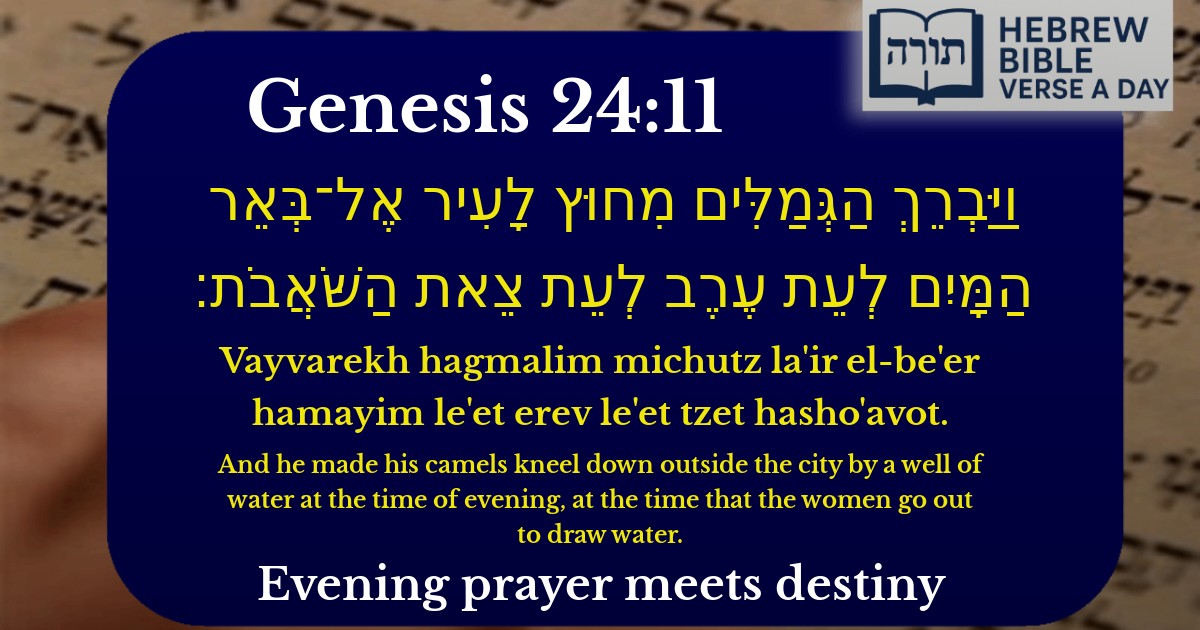Join Our Newsletter To Be Informed When New Videos Are Posted
Join the thousands of fellow Studends who rely on our videos to learn how to read the bible in Hebrew for free!
Hebrew Text
וַיַּבְרֵךְ הַגְּמַלִּים מִחוּץ לָעִיר אֶל־בְּאֵר הַמָּיִם לְעֵת עֶרֶב לְעֵת צֵאת הַשֹּׁאֲבֹת׃
English Translation
And he made his camels kneel down outside the city by a well of water at the time of evening, at the time that the women go out to draw water.
Transliteration
Vayvarekh hagmalim michutz la'ir el-be'er hamayim le'et erev le'et tzet hasho'avot.
Hebrew Leining Text
וַיַּבְרֵ֧ךְ הַגְּמַלִּ֛ים מִח֥וּץ לָעִ֖יר אֶל־בְּאֵ֣ר הַמָּ֑יִם לְעֵ֣ת עֶ֔רֶב לְעֵ֖ת צֵ֥את הַשֹּׁאֲבֹֽת׃
וַיַּבְרֵ֧ךְ הַגְּמַלִּ֛ים מִח֥וּץ לָעִ֖יר אֶל־בְּאֵ֣ר הַמָּ֑יִם לְעֵ֣ת עֶ֔רֶב לְעֵ֖ת צֵ֥את הַשֹּׁאֲבֹֽת׃
🎵 Listen to leining
Parasha Commentary
📚 Talmud Citations
This verse is not quoted in the Talmud.


Context of the Verse
This verse (Bereshit 24:11) describes Eliezer, Avraham's servant, arriving at the well outside the city of Nachor in search of a wife for Yitzchak. The scene sets the stage for the encounter with Rivka, demonstrating divine providence (השגחה פרטית) in the selection of the matriarch of the Jewish people.
Significance of the Camels Kneeling
Rashi explains that Eliezer made the camels kneel (וַיַּבְרֵךְ הַגְּמַלִּים) as a sign of respect and humility, indicating that he would not enter the city until he completed his mission. The Kli Yakar adds that this act demonstrated his trust in Hashem's guidance, as he positioned himself at the place where he was most likely to meet potential candidates for Yitzchak's wife.
The Timing: "At the Time of Evening"
The verse specifies that this occurred לְעֵת עֶרֶב (at evening time). The Midrash (Bereshit Rabbah 60:5) notes that righteous individuals like Eliezer conduct their affairs with precision, aligning their actions with opportune moments. Evening was chosen because it was when women would gather to draw water, increasing the likelihood of finding a suitable match.
The Well as a Symbol
The well (בְּאֵר הַמָּיִם) is a recurring motif in Torah narratives involving marriage (e.g., Yaakov and Rachel, Moshe and Tzipporah). The Ramban explains that wells symbolize life, blessing, and Torah—qualities essential for building a Jewish home. By stationing himself there, Eliezer sought a woman who embodied these traits.
Women Drawing Water
The phrase לְעֵת צֵאת הַשֹּׁאֲבֹת (the time when the drawers of water go out) highlights Rivka's kindness, as she not only drew water for Eliezer but also for his camels (Bereshit 24:19). The Talmud (Ta'anit 4a) teaches that acts of kindness are a defining characteristic of the matriarchs, and this moment foreshadows Rivka's suitability as Yitzchak's wife.
Divine Providence in the Details